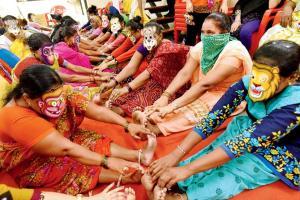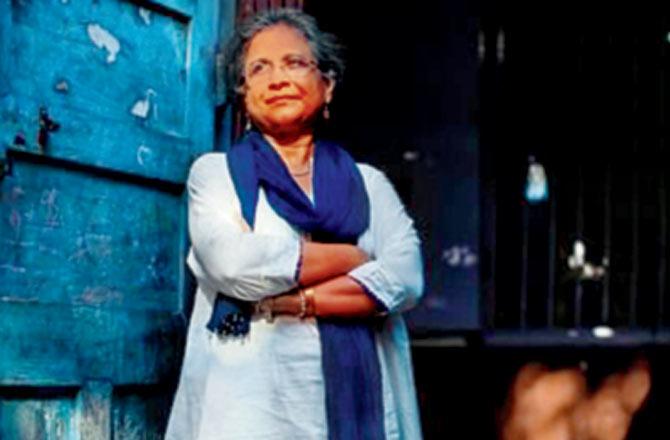Commercial Sex Workers (CSWs), much like other workers from the unorganised sector, depend on daily earnings to survive and don't have savings to fall back on.

Sex workers from Kamathipura ahead of World Yoga Day in 2019. NGOs say CSWs don't have access to masks and hand santisers. Pics/Getty Images
Over the past one week, images of migrant labourers struggling to reach their respective villages in the midst of the pandemic led to furore among the more privileged city folk. Several state governments stepped in, promising to look after those unable to fend for themselves during the public health crisis. But, there is one vulnerable section of workers that remains largely ignored by both, the general public and the government.
Commercial Sex Workers (CSWs), much like other workers from the unorganised sector, depend on daily earnings to survive and don't have savings to fall back on. Not only have they lost a majority of their clientele and earnings due to the lockdown, but they also don't have access to preventive measures such as face masks and hand sanitisers.

Aanchal Narang
"I used to get around three customers a day, and on a good day, I would earn as much as R1,000. However, in the last week I have only managed to get two customers and earned a mere R500," revealed a CSW on condition of anonymity, reflecting the sharp decline in her income. The 33-year-old trans woman said that soliciting has become difficult because there are hardly any people on the streets. Messaging her regular customers, sending them pictures of herself, hasn't yielded any business. She has had to resort to borrowing money from her Guru and her boyfriend to sustain herself through the lockdown.
Aanchal Narang, 26, is a therapist and trainer, who launched a fundraising campaign aimed at providing essential supplies to sex workers. A heart-rending experience in 2019 from when Narang was pursuing a master's degree from the Tata Institute of Social Sciences prompted her to act with alacrity as soon as the lockdown was announced. "I did a community mental health project with sex workers in Kamathipura. One of them spoke about how she had to survive on only Parle-G biscuits and water for an entire week during demonetisation because she didn't have the money she needed to buy food," recounts the psychologist. Three days was all it took for Narang to raise R3,21,645 from 278 benefactors, who came together virtually, to make her crowd-funding campaign a success. She has now launched a similar campaign to raise funds for homeless women.

Trina Talukdar
The amount she gathered has been given to Prerana, an NGO that works in the red-light districts of Mumbai with the aim of ending inter-generational prostitution. It strives to protect and educate CSWs and their children. "The police has clamped down on red-light areas, preventing CSWs from soliciting. Some of them don't even have the money to meet minimum nutritional requirements and have to rely on informal moneylenders. It is important to understand that social distancing also means that CSWs are isolated from their social support systems," remarks Priti Patkar, the co-founder and director of Prerana.
The NGO has created a packet of essentials consisting of food and hygiene supplies worth R1,200. These will last a CSW for 21 days by herself and for 15 days if she has a child. The relief packages will reach 300 of them. But this isn't sufficient. Kamathipura alone has thousands of sex workers.

Pic/vitalvoices.org
Bani Das is the co-founder of Kranti, an organisation that works with the daughters of CSWs. Das told us that at least three CSWs, who are the mothers of children enrolled at Kranti, are staying at the non-profit's shelter home because they have nowhere else to turn. "CSWs are not accounted for when people speak of daily wage workers. So, social welfare schemes don't reach them. For instance, a lot of CSWs are HIV+ve or have other illnesses. But it's almost impossible to get medication right now as supply chains are down and travelling to government centres during a lockdown is virtually impossible," explains Trina Talukdar, another co-founder of Kranti. Talukdar shed light on the living conditions in Kamathipura, which are such that social distancing is not feasible. As many as eight people share a room sometimes and they use common bathrooms. And often, there is no water to follow the most basic rule laid down by the doctors—washing your hands regularly for
20 seconds.
Catch up on all the latest Crime, National, International and Hatke news here. Also download the new mid-day Android and iOS apps to get latest updates
 Subscribe today by clicking the link and stay updated with the latest news!" Click here!
Subscribe today by clicking the link and stay updated with the latest news!" Click here!









